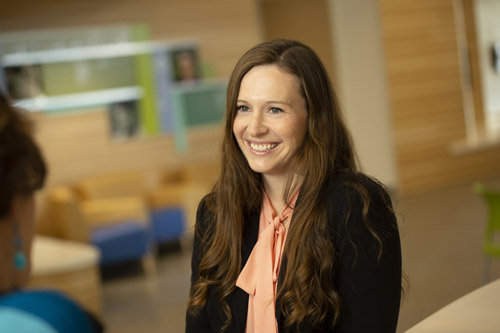Julie Bidwell explores how to help families face heart disease together
 Julie Bidwell is an assistant professor in the Family Caregiving Institute at the Betty Irene Moore School of Nursing at UC Davis.
Julie Bidwell is an assistant professor in the Family Caregiving Institute at the Betty Irene Moore School of Nursing at UC Davis.
Insufficient information about how families manage heart failure has long concerned Julie Bidwell, an assistant professor in the Family Caregiving Institute at the Betty Irene Moore School of Nursing at UC Davis. Her research during the past decade revealed the experience of heart failure is a shared stressor for both patient and caregiver, with concerning trade-offs in health for all people facing these challenges.
People who undergo surgery, are hospitalized or diagnosed with a chronic disease expect a regimen of at-home care. Depending upon the individual’s health and the condition being treated, the home care component ranges from a brief period of minimally disruptive therapy to long-term intensive treatment that can be incredibly demanding for all involved. The day-to-day management of disease exerts considerable stress on families and family relationships. That’s particularly true for families who are dealing with end-stage heart failure or have undergone life-saving cardiothoracic procedures, such as a heart transplant or implantation of a ventricular assist device (heart pump).
Bidwell became acutely aware of the strain on families after beginning her career as a clinical nurse and nurse educator in a cardiovascular unit at Oregon Health and Science University, where her duties included designing evidence-based practice modules.
“The postdischarge period was overwhelming for both patients with newly implanted ventricular assist devices and their family members who suddenly found themselves responsible for life support equipment in their homes, a situation that is particularly stressful for people living in isolated areas,” Bidwell said. “So, I was asked to create an evidence-based module to help us better support these families. Finding little evidence was the turning point in my decision to pursue a career in research.”
While completing a postdoctoral fellowship at Emory University in Atlanta, she connected with Heather M. Young, then dean of the School of Nursing. Bidwell became convinced that she should pursue her research career at UC Davis.
“What attracted me to the School of Nursing was a strong commitment to interdisciplinary science, collaboration and innovation,” Bidwell said. “The work coming out of UC Davis is the product of true team science among faculty members and doctoral students who are thinking forward about how to reshape the health system.”
Meandering career path inevitably led to nursing
Julie Bidwell’s childhood home was a repository of textbooks and scientific journals collected by her mother, a cardiovascular nurse, and her father, an earth scientist.
Despite this early exposure to nursing and science, she was intent in her youth to carve her own path and obtained an undergraduate degree in Russian language and literature at UCLA. But knowledge of the devastating human impact of cardiovascular disease eventually compelled her to return to her early interests and enter a career in nursing and health sciences, with a focus on family-level outcomes.
“It’s apparent that a paradigm shift is needed in health care to enable clinicians to provide truly personalized care — not only for individuals but also for entire families as needed,” Bidwell said. “In my research, I focus not just on patients or caregivers individually, but rather on the two of them together, in order to focus on outcomes that are important to both of them. We should never be comfortable with leveraging the health of one person to improve the health of another person.”
Bidwell believes that collaboration pushes science across all stages of research to influence policy at the national level.
“Having left the bedside as I did, that’s very important to me because I can still make an impact in improving health, on an expansive scale,” she said.





